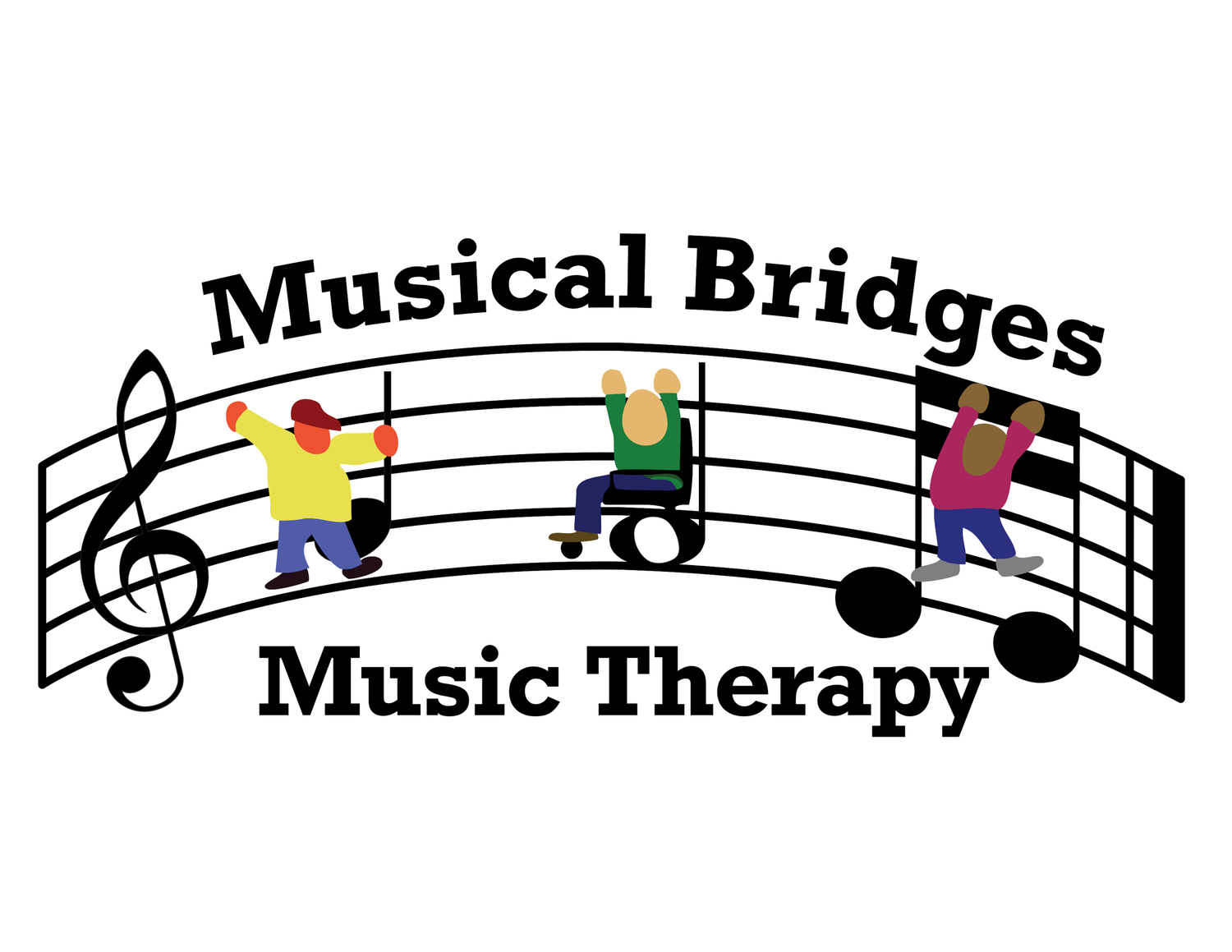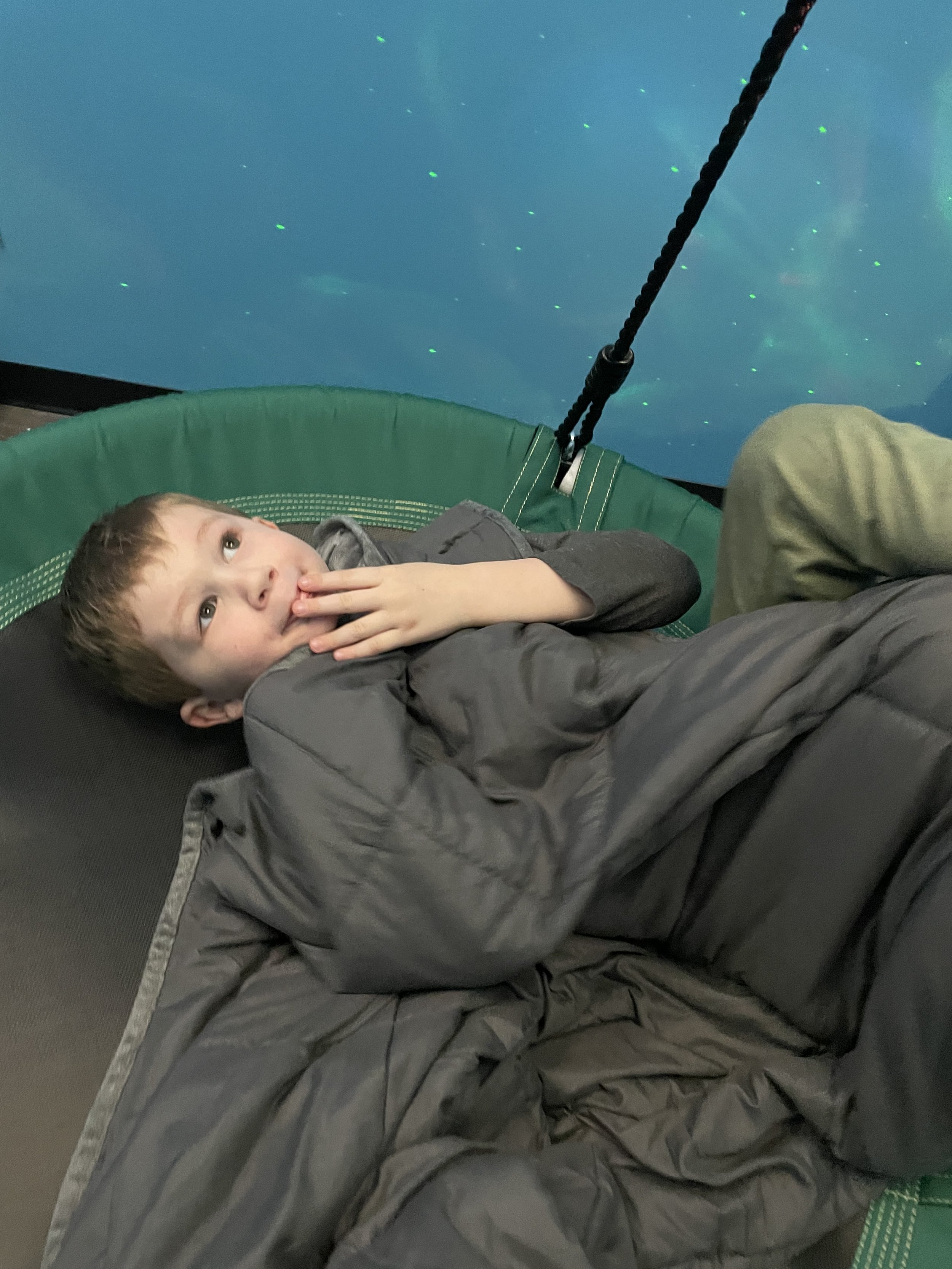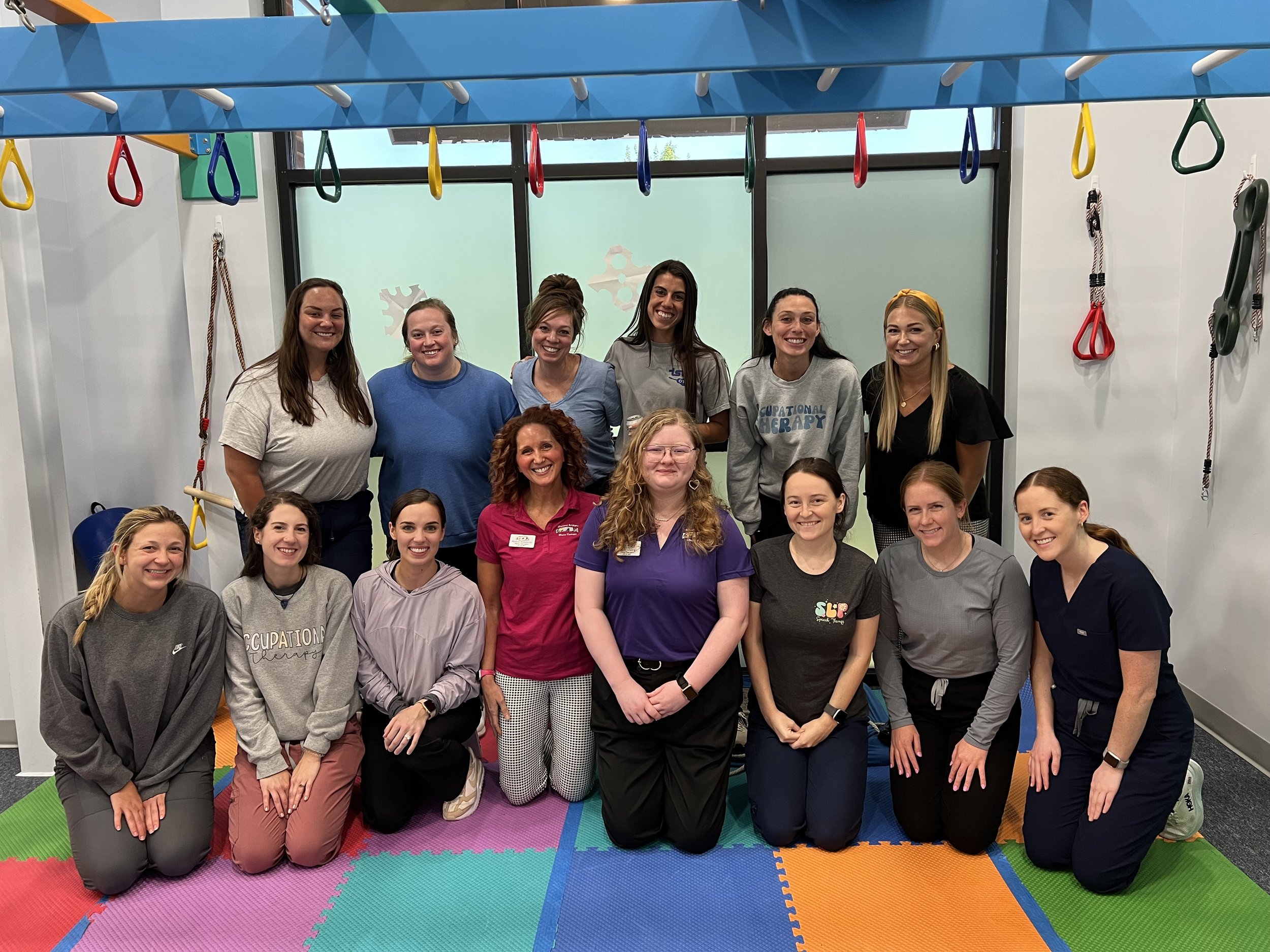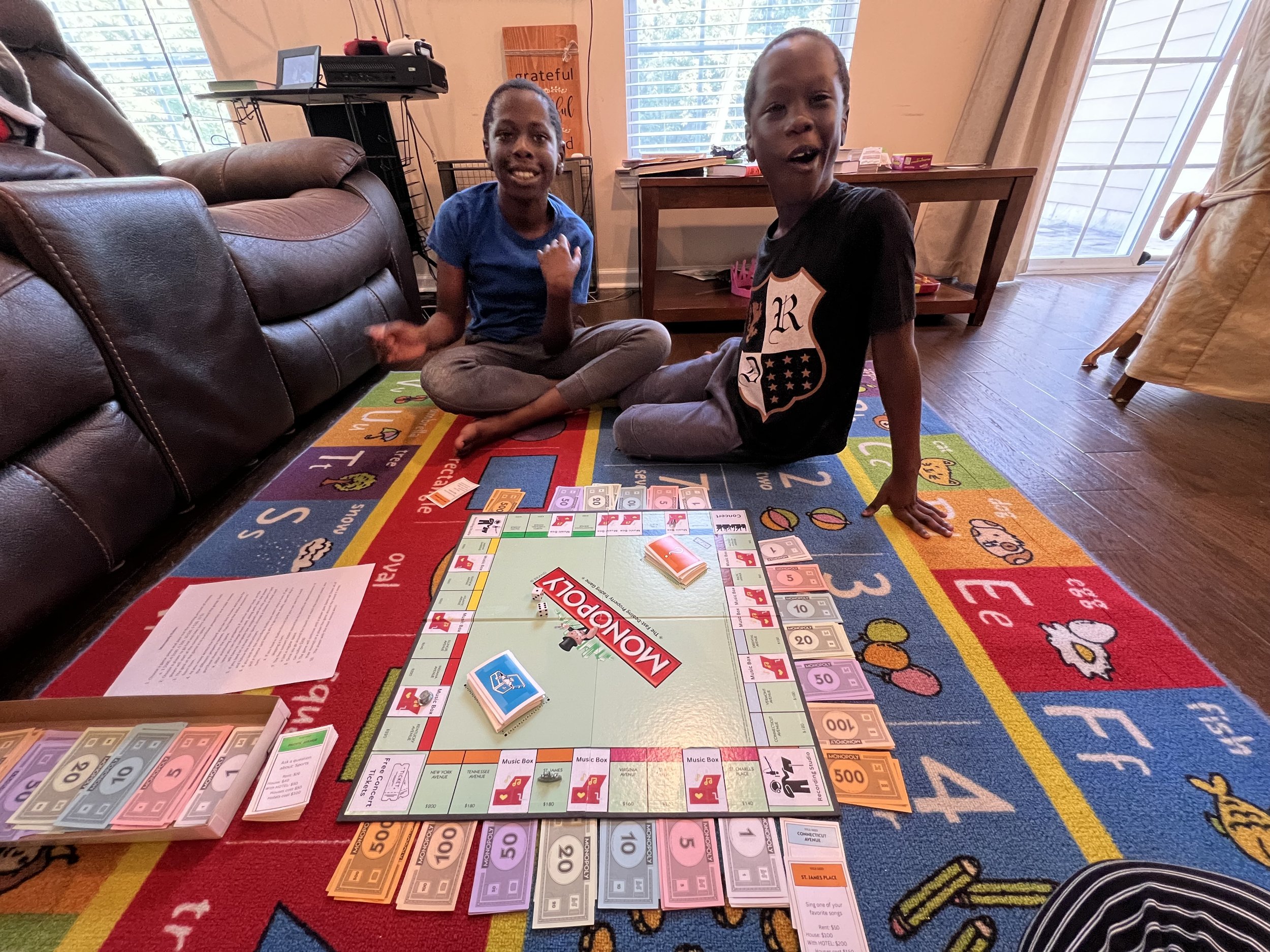Music Therapy
Client-Centered
Therapy sessions at Musical Bridges use a humanistic, client-centered approach to effect positive change and growth. We offer exciting, engaging musical interventions that challenge clients to reach their full potential. If applicable, families are given optional homework songs, activities, or visuals to complete to further reinforce concepts learned in therapy.
Strategies you might see in a session include:
Neuroscience based learning
Play based learning
Visual supports
Visual schedules and use of individual token systems
Velcro activities
Music books and games
Use of PECS, sign language,, or other alternative communication systems
Sensory-Integrated
We promote sensory regulation through the provision of sensory breaks and unlimited access to the sensory room and materials, such as swings, in order to support clients’ sensory processing and overall well-being.
Materials available include:
Swings in every therapy room
Weighted blanket
Dimmable lights
Light features
Liquid floor tiles
Flexible seating choices (standard chair, carpet, wobble chair, yoga ball, wobble cushion, couch, scooter, balance board)
Calming kit
Breathing ball
Basket with wide selection of fidgets
Basket with selection of calming instruments (ocean drum, rainstick, cabasa, singing bowl)
“I need a break” visual supports
Goal-Orientated
After a comprehensive assessment, we tailor treatment to specific non-musical goals. Staff and/or family receive detailed progress notes monthly. Goals are tracked using measurable graphs that can be shared with the treatment team or for a school IEP meeting.
Sample goals areas:
Communication/Speech
Motor skill development
Social skills
Sensory regulation
Cognitive development/academics
Emotional expression
Self-help
For all ages and populations
Musical Bridges music therapists have a vast array of training and approaches. All of our therapists are trained in Neurologic Music Therapy, others in Nordoff Robbins (improvisational) Music Therapy. Some have additional education with Gestalt Language Processing, eldercare, and incorporating behavioral (ABA) techniques. We match personality and expertise with each client. Music therapy is available for infants through the elderly.
Primary populations:
Autism
Intellectual Disability
Learning Disability
Communication Disorders
Elderly/Dementia
Creative collaboration
Our Musical Bridges therapists collaborate not only with one another but alongside other treatment team professionals to ensure we are all working towards similar goals to stay on the same page. Most importantly, we value the feedback from parents and caregivers above all and realize you know the client best.
Neurologic Music Therapists
We are a practice of Neurologic Music Therapists. Neurologic Music Therapy (NMT) is a specialized area of music therapy requiring advanced training. It is based on a neuroscience model of music perception and production, and the influence of music on the brain. Musical Bridges is specialized in using NMT techniques. Learn more.
Sibling and Family Sessions
Add siblings and/or parents to your child’s individual music therapy session to foster positive interactions between family members, transfer skills home, and provide a safe environment for improving social skills.
Possible goals include:
Turn taking
Expressing emotions
Cooperation
Self-regulatory skills
Self-help skills
Fine/Gross motor skills
Improved family communication
Inhibitory Control

FAQs
Can you come to me?
Yes. We conduct therapy sessions in our clinic in Brentwood, homes, schools, day programs, nursing homes, therapy centers, and online.
What openings are available?
We work every weekday until approximately 7:00 and on Saturdays. If you are interested in signing up for music therapy, contact us for any open time slots.
How long is each session?
It all depends on what works best for you. Most clients choose a 60 minute session 1-2 times a week. For some, 45 minutes or 1.5 hours is a better option. Very few opt for a 30 minute session because it’s difficult to make progress towards goals in such a short period of time.
What does a typical music therapy session look like?
No session looks alike because we individualize each session to every client, writing personalized songs and interventions specific to them. However, all start with a hello song and end with a goodbye song. The middle could include: active music making, movement to music, singing, sensory exploration, music improvisation, and more.
Do I need any music skills in order to do music therapy?
Absolutely not! It helps if the client enjoys music, but, since we will not be learning any instruments, no skill is required. We will only be using instruments to help achieve non-musical goals. Don’t allow feelings of inadequacy in musical ability keep you from attempting a music-based therapy.
How much is the tuition?
Rates fluctuate based on travel. Individual therapy sessions start at $400/month for a 60 minute session. Have questions about how to pay for music therapy? Check out our funding page here.
Do you offer any discounts?
Yes! For each additional family member enrolled we offer 10% off. If you enroll for multiple session per week we offer additional discounts as well. We also offer prepay discounts.
Do you accept insurance?
Unfortunately Tennessee has been “behind the ball” when it comes to insurance reimbursement for music therapy services. Music therapy can be reimbursed by insurance but unfortunately, there have been very few cases of successful insurance reimbursement in TN. However, we have clients receiving reimbursement for music therapy with out of state insurance. We are more than happy to work with you to attempt to bill your insurance but we cannot guarantee coverage. With that being said, we can accept flexible spending health care (HSA) cards that have a major credit card symbol. We will also gladly provide you with all the the CPT codes you will need to attempt to receive reimbursement from your insurance company on your own. Music therapy can be included on a child’s Individualized Education Plan (IEP) or Individualized Family Support Plan (IFSP) when determined necessary. We also offer payment plans and adjusted treatment schedules if needed.
What if I decide it isn’t for me?
We know you’ll love being a part of the Musical Bridges family. However, we only need a 4-week notice to discontinue any service.
Do you have any reviews I can read?
Yes, absolutely! Check them out here.







